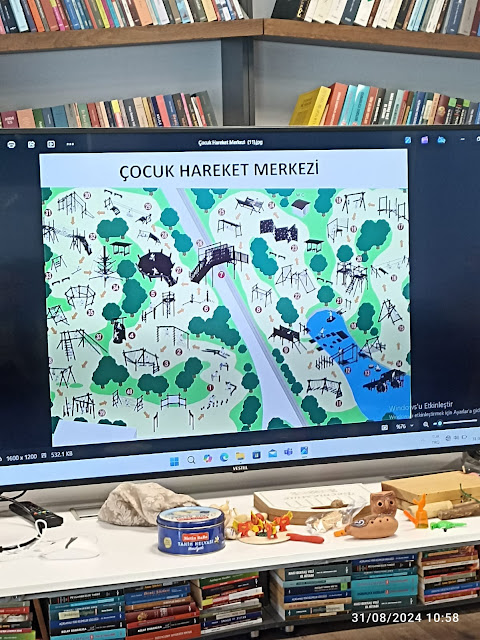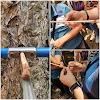Founded in 2019 in Ankara, Turkey, Green Forest School continues its educational, workshop, and advocacy efforts to expand the concept of forest schools for children. Advocating for children's right to receive education in a clean, healthy, and sustainable environment, Green Forest School remains committed to raising awareness through its activities.
The 4th Forest School Workshop, following previous sessions held in 2021 in Ankara, 2022 in Kayseri, and 2023 in Güdül, Ankara, was successfully organized on August 30-31, 2024, in Eskişehir. In an age where traditional children’s games are at risk of being forgotten, this workshop aimed to preserve and promote the culture of play while emphasizing a nature-centered educational model. The workshop was organized by the Green Forest School team along with new partners and supporters.
A total of 22 educators from 11 different provinces of Turkey participated in the workshop. Under the coordination of Game Explorer Teacher Ayşe Gümüş, the event focused on forest pedagogy, aiming to contribute to building a future where children can play freely and in harmony with nature. Over the course of two days, 11 presentations were delivered, and 21 significant decisions were made by the participating educators. These decisions aim to further strengthen the forest school approach and implement it across various educational settings to provide children with more opportunities to play in nature.
As Green Forest School continues to promote sustainability in education and a harmonious lifestyle with nature, the organization is committed to hosting more workshops in the future to further disseminate the forest school culture.
Mustafa Çetin, the leader of the Green Forest School, expressed his gratitude to all contributors to the workshop, emphasizing that the decisions were prepared with great care.
Decisions Made:
Inclusivity and Harmony with Nature: Forest school workshops should be conducted with an inclusive, nature-aligned approach that centers on children's participation. Emphasis should be placed on play being a process, not just an outcome.
Ecosystem-Based Education: Education in forest schools should be planned in alignment with forest pedagogy, ecosystem knowledge, and botany.
Soil and Stone Collections: Forest schools should create soil and stone collections to increase children's interaction with natural materials.
Integration of STEM and Alternative Education: STEM and alternative education approaches should be integrated into forest schools.
Support for Academic Studies: Academic studies based on ancient knowledge and experience in forest school leadership should receive more support.
Nature Deficit Syndrome: To prevent children from suffering from nature deficit syndrome, nature-based supports (such as forest bathing, grounding, etc.), referred to as "Vitamin T," should be increased.
Safe Forest Areas: When determining safe forest areas, regions at risk of fire, severe weather, or human activities should be avoided.
Safe Communication: During the educational process, safe and effective communication methods with children should be used, avoiding negative and abstract concepts.
Preservation of Traditional Games: Traditional children's games should be preserved and made applicable in forest schools. A publication should be prepared on this subject.
National Publications and Guides: National magazines and various guides on forest school games and activities should be published.
Play Explorer Projects: A national summit on traditional children's games based on ethnosports could be organized in Turkey. New play explorers should emerge from this context.
Increased Academic Publications: The number of academic, event, and guide publications on forest schools should be increased. Special educational materials, forest game guides, and instructional publications for forest schools should be created.
Schoolyard Landscape Guide: A schoolyard landscape guide should be developed into a new manual.
Use of Artificial Intelligence: Artificial intelligence tools (such as ChatGPT, Gemini, etc.) should be effectively used in forest school projects.
Risk Analysis: Comprehensive risk analysis should be conducted in forest school projects, supported by AI tools.
Literature Reviews: Platforms such as Consensus, SciSpace, and ScholarAI should be used for literature research in forest pedagogy projects.
Sharing Forest School Outputs: Regular meetings should be held to share workshop outputs and discuss the applicability of this information in educational approaches.
Next Year's Congress: It was decided to hold the National Forest School Congress in Istanbul next year as a continuation of this workshop series.
Outdoor Education Spaces: Outdoor education spaces (e.g., Forest Pedagogy application areas, Children's Movement Center, Eskişehir Rock Park) should be included in forest school programs.
Gamification: Gamification techniques should be used in forest schools to increase children's interaction with nature.
Play-Focused Approach: Play-focused approaches should be adopted in the educational process to foster children's love for nature.























0 Yorumlar
Yorumunuz İçin Teşekkürler..